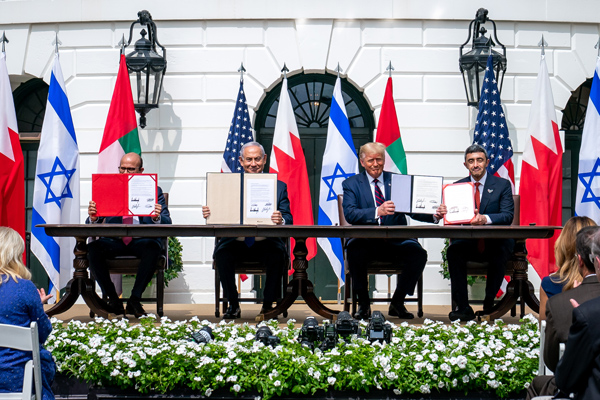
Washington, D.C. — As Congress works to finalize the 2024 National Defense Authorization Act (NDAA), bipartisan efforts to strengthen the Abraham Accords remain central to the legislation. The NDAA, passed annually without fail for 63 years, is a cornerstone of U.S. national security policy. This year, provisions to enhance regional defense cooperation in the Middle East signal Congress’s enduring commitment to the accords despite recent challenges, including the October 7 attacks on Israel.
The Abraham Accords, brokered in 2020, established normalization agreements between Israel and several Arab nations, marking a major shift in Middle East diplomacy. The 2024 NDAA builds on these foundations, including key initiatives to deepen military and technological collaboration among U.S. allies in the region.
Key Provisions in the 2024 NDAA
Among the highlights of the proposed legislation is the Learning Integrated National Knowledge (LINK) for the Abraham Accords Act, which appears in both House and Senate versions. Spearheaded by bipartisan leaders like Senators Joni Ernst (R-IA) and Jacky Rosen (D-NV), and Representative Jimmy Panetta (D-CA), the LINK Act focuses on fostering military subject-matter exchanges between the U.S. and its Middle Eastern partners. This program aims to expand regional military ties while maintaining the U.S.’s role as a convener, easing political tensions related to Israel’s participation.
The Space Technology and Regional Security (STARS) Act is another bipartisan effort included in both versions of the NDAA. This legislation directs the Department of Defense to develop a regional space and satellite strategy, enhancing data-sharing capabilities among U.S. allies. By improving threat detection and integrated air and missile defenses, the STARS Act builds on previous efforts like the 2022 DEFEND Act to bolster collective security against threats, particularly from Iran.
Senate-Exclusive Initiatives
The Senate version of the NDAA introduces additional measures to advance the accords. The AI Allied Cooperation for Crucial Operations, Research, and Deployment (AI ACCORD) Act, led by Senators Ernst and Kirsten Gillibrand (D-NY), aims to create a strategy for real-time defense information sharing among regional partners. This initiative seeks to leverage cutting-edge technologies, including artificial intelligence and zero-trust networks, to overcome technical and trust barriers in data sharing.
Another key provision is the U.S.-Jordan Defense Cooperation Act, championed by Senators Marco Rubio (R-FL) and Rosen. This legislation would enhance Jordan’s ability to counter air and missile threats while integrating its defense systems into the regional architecture. By strengthening Jordan’s defensive capabilities, the provision supports broader regional security goals.
Bipartisan Commitment to the Abraham Accords
The NDAA’s provisions reflect bipartisan consensus on the importance of advancing the Abraham Accords as a stabilizing force in the Middle East. Despite setbacks, such as heightened regional tensions following the October 7 attack, Congress has remained focused on fostering defense cooperation and regional integration.
As negotiations to reconcile the House and Senate versions of the NDAA progress, lawmakers are expected to retain the core provisions supporting the Abraham Accords. Once finalized, the legislation will likely provide critical tools for enhancing regional stability, strengthening U.S. partnerships, and advancing the vision of a more peaceful Middle East.